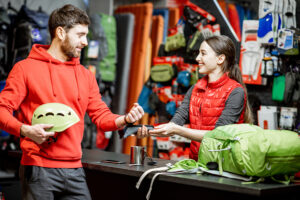Improving Business Processes Through Technology
Merchants: How would you like to know when loyal customers are in your store and what they are shopping for without walking onto the sales floor? And wouldn’t it be nice to be able to give them a customized shopping experience, pointing them toward what they want without lifting a finger? If this sounds impossible or like something out of George Orwell’s “1984” – think about that for a minute – it’s not. Improving business processes with technology is among the top business trends experts see coming in retail shopping over the next three years, and here are some ways you can join the movement.
Like it or not, Artificial Intelligence (AI) will play a big role in how retail businesses evolve over the next decade. Even though it may seem like it’s only the realm of corporations and big business, there are elements of artificial intelligence in many easy-to-use and affordable digital solutions, putting it within reach of independent merchants, too.
In many cases, AI is simply smart automation that uses predictive analytics to “learn” the behaviors of shoppers through past purchase data, and when retailers put those algorithms to work, beautiful sales can happen. In analyzing the top retail trends of 2018, Biz Tech says that AI applications “will gain more clout.”

Nicole Leinbach Reyhle, founder of the industry website Retail Minded, thinks that retailers who automate and improve business processes with technology will be able to run their stores more efficiently and be more successful.
Data is becoming nearly as valuable as cash and inventory in retail, and merchants who utilize it properly by automating business processes are going to be at the forefront of their markets. Digital solutions currently available with point of sale systems that analyze sales data and forecast buying trends not only serve retailers well, it makes shopping a more pleasant experience for customers because they find what they want to buy.
“AI cannot replace human decision-making, though,” Leinbach Reyhle tells Biz Tech. “The data is only as strong as the people who review it. Ultimately, as business leaders, we have to be proactive enough to make decisions based on the data that is received.”
Data-Personalized Shopping and Sales
Using that data to have the right items in stock at the right prices at the right time allows merchants to streamline business processes and “personalize” shopping experiences for their best customers, which happens to be another hot technology trend for 2018. Retailers are using their sales data to customize service for repeat customers, and to develop strong internet and social media profiles to better interact with shoppers. Many are also using it to empower sales associates to create their own digital presence on company websites which allows them to become brand ambassadors for their stores. National Retail Federation 2018 panelists say engaged sales associates are key to retail success.
“That relationship between shoppers and sales associates is evolving rapidly,” Leinbach Reyhle says. “Now, you are able to expand that relationship beyond that store visit.”
The New Internet
The Internet of Things (IoT) is another technology that is creating valuable and useful data for people, business processes and items, according to the Zebra 2017 Retail Vision Study. The Internet of Things contains information gathered from devices embedded in billions of items ranging from sneakers to home appliances and automobiles. Gartner, an analytics company, estimates that more than 20 billion items will be connected to IoT by 2020.
Use of data on the IoT ranges from an airplane manufacturer monitoring the performance of a jet engine or a trucking company using driverless big-rigs, to something as simple as a smart thermostat for a home that can be switched on or off using a smartphone app.
The Retail Vision Study sees merchants using the technology to enhance customer shopping experiences, increase supply chain visibility, and increase revenue opportunities. Collecting data from customers and items allows retailers to not only personalize shopping experiences, but also lets them forecast market demand and improve other business processes, too.
“As the retail landscape changes, stores are finding new ways to adapt, and the key way they will do so is with software that can track data in stores with sensors and software like never before,” says Dan San, director of sales at Meural and a member of the Young Entrepreneur Council (YEC). “We are now becoming able to track impressions, conversions and how long a person looks at products in-store. It’s a game changer because this was only possible online with websites and e-commerce.”
The IoT is also expected to streamline checkout in bricks-and-mortar stores. With items already wired into the IoT, there will be no need to scan items at checkout. Point of sale systems will already “know” what items are in a shopping cart or bag. Customers will only have to make an electronic payment to exit the store. And, eventually, even stopping to pay for your goods will disappear as touchless and other forms of electronic payments are put into use. Amazon’s Go store is the first example of this kind of technology in use.
Automation of ordering, inventory tracking and checking in-store stocking is another technology trend in the Retail Vision Study. Such business process improvement isn’t a great leap in technology for many merchants, though. Many sophisticated digital management solutions and point of sale systems already offer many of these features.
One form of current household technology will become more prevalent in stores. Voice assistants such as Alexa, Siri and Google will soon be placed on store shelves to help customers locate items or offer product information.
Going Mobile
The Who’s hit song made the term “Going Mobile” popular way back in 1971. It took a few decades for communications technology to catch up, but smart phones are now an important avenue for retailers to reach customers. The Pew Research Center says 52% of U.S. cellphone owners access their email from their phones and, according to the 2017 Connected Shoppers Report, 34% of shoppers say they have used a mobile device to research a product while they were inside a store. That trend will continue, according to most experts.

“Small businesses must be laser-focused on mobile in 2018. Google will be rolling out the ‘mobile-first index,’ which will introduce another big shakeup in search. If you pick one technology to focus on in 2018, make it mobile site performance and usability,” Francois de Lame, of Policygenius, Inc. and the YEC, tells Small Biz Technology.
Mobile technology not only allows retailers to market to new shoppers and reward customers with loyalty programs, it also allows them to manage the store from virtually anywhere. Remote desktop applications that allow access to files and cloud-based applications keep retailers connected while they’re on the go.
Keeping the Store Safe
As retail technology evolves to be increasingly digital and mobile, security will follow suit. That includes transaction encryption, email security and data protection. The Payment Card Industry Data Security Standard (PCI DSS) requires that all companies accept, process, transmit and store credit card information securely. EMV (Europay, Mastercard, Visa) chipped payment cards have add extra security for sales transactions. And sophisticated point of sale and digital management systems offer an additional layer of security for many different types of business records, not just transactions.
“Small businesses need to secure their information in case of disaster. By moving books to a secure cloud platform, small businesses can maintain audit records and it also adds an extra layer of security with two-step verification,” says Nelson Da Silva, chief revenue officer at Receipt Bank.
Meeting the Challenge
The challenge for independent business owners is finding the right kind of technology and the proper amount that results in business process improvement. It’s kind of like buying athletic shoes today. Options are endless. Do you want trail or street running shoes, basketball high tops, court shoes, hikers, cross trainers, deck shoes, or just casual kicks? Once the decision is made, you just need to find the right fit.
Brian Bullock
Author


